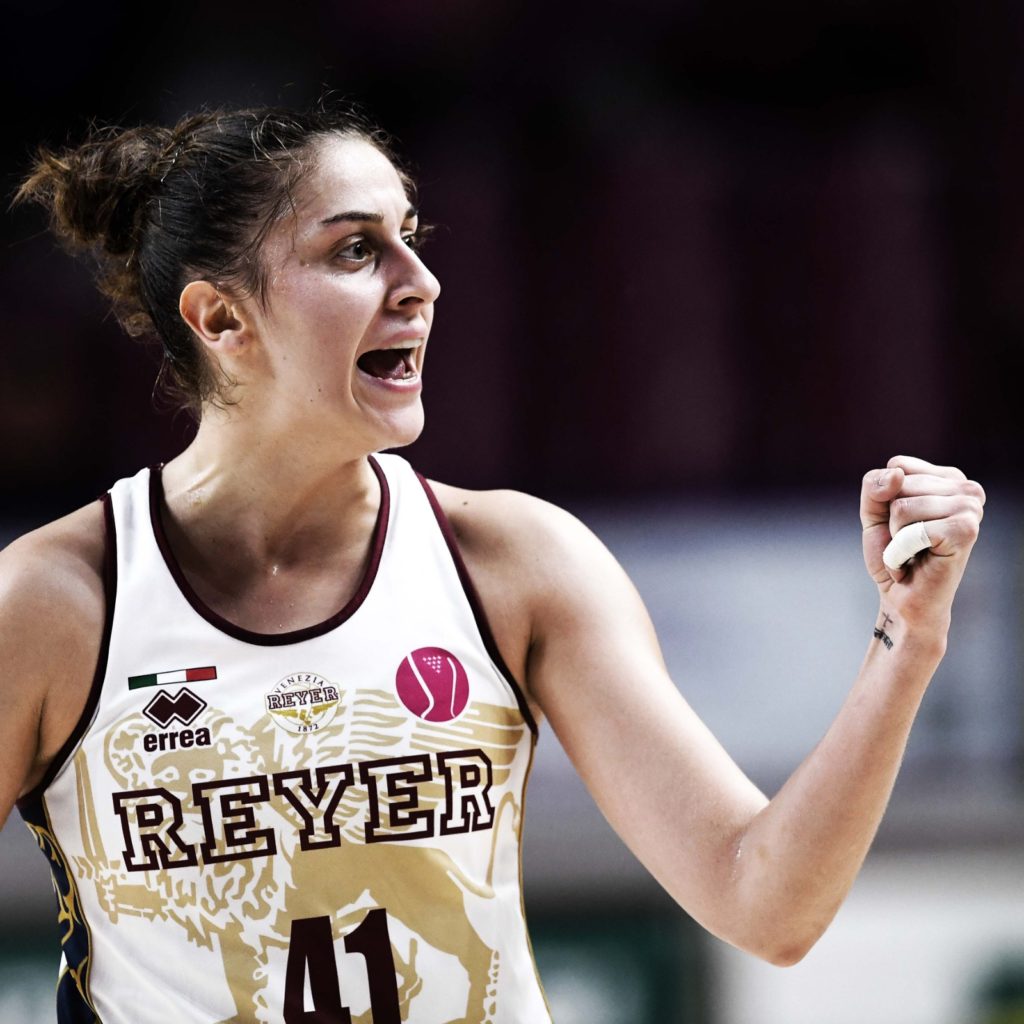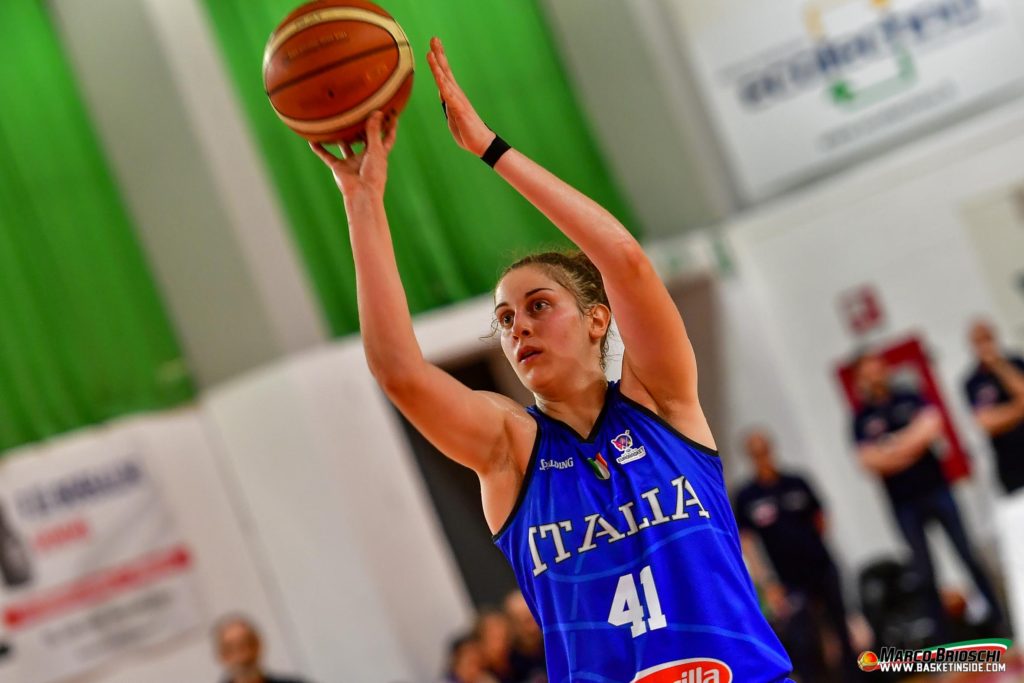Interview to Elisa Penna, Italian Basketball player
by Amina Sofia El-Maghraby, Italian correspondent
“Basketball amuses me, I love it. Basketball means sharing, it teaches you how to stay with others, to be respectful, and as my father used to say, it’s a school of life”.

For Elisa Penna, 25 years old, basketball is all her life. She started playing when she was only six years old “but my mom often tells me that I was practically born with the ball in my hands“.
At the age of fifteen, she moved to Rome to play for College Italia, a team created by the Italian Basketball Federation, with whom she played the minor and major league, Serie A2, championship. After this experience, Elisa moved to Venice to play with the famous club Reyer Venezia in the major league, Serie A1 and A2 championship, until she was nineteen years old. In 2014 she has been accepted at the Wake Forest University (USA) where she played for the University Basketball Team and she successfully obtained a degree in Psychology. In 2019 Elisa came back to Italy to play for Reyer Venezia and wear the National team jersey.
Elisa says that she would have never imagined reaching such a high goal in her sport career as she genuinely started this sport to have fun, it was a way to play and compete with her brothers.
“Sure, I used to have secret dreams and I wished that one day, they would come true. I continued to do what I loved, with passion, dedication and joy as long as the first satisfactions started to arrive, and I began to believe that this sport could become something more in my life“.
During her sport career, and in life, Elisa admitted having found some obstacles which she had to overcome in order to improve and grow. “I am convinced – said Elisa – that from any situation, positive or negative, it’s always possible to learn something that will allow us to move one step further in this personal path, which is life“.
Fascinated by Elisa’s experience I wanted to know more about the role and the meaning of female basketball players in Italy.
During your career as an athlete, have you ever felt to be treated differently from your male colleagues?
“I have often felt the perception of being treated differently than a male colleague, both in Italy and in the United States, where I lived for four years studying and playing for the college of Wake Forest.
Examples of disparity are the salary they received and the sponsor opportunities, which are not the same at all. In the male basketball world, there is a higher circulation of money. This is dictated by both the number of sponsors and sports clubs have and for the popularity that men’s basketball has, due to the strong promotion on television, which is missing in women’s basketball. Therefore, the investments for women’s basketball are really low, so as a result, the lack of money affects the salaries with lower wages for the female players.
Apart from this, also with regards to individual sponsor, unfortunately there are much more investments in the male world than in the female one. This choice is probably dictated by the fact that men gain more exposure at a media level than women. In general, in Italy the focus is less on women’s basketball, it’s seen as a greater risk.
Another important factor linked to the gender inequality in the Italian basketball world, is that according to the law 91/1981, men who play at high level (for example Series A1) are regarded as professionals. This means that they are considered full-fledged workers, so they have paid contributions, a pension fund and all the protections provided by law.
However, women, are considered “amateurs”, they are not contemplated as real workers, even though their life is completely the same as the one of their male colleagues: hours and hours at the gym, the risk of getting injured and a lot of sacrifices. Indeed, perhaps in a sense we, as women, often find ourselves sacrificing more. Just thinking about the desire to start a family and to become mothers. There are things we have to postpone in order to play basketball at the very high level, but it should not be like that“.
Do you think becoming a mother could compromise your career? Do you think, if this will happen, you would still be considered by the sport market as an athlete to focus on?
“Becoming a mother could compromise a player’s career, even though there are those who had a son and they returned to play at highest level here in Italy. Just thinking of Kathrin Ress and Benedetta Bagnara, both mothers and both women who have played in the top flight of our league and have dressed the National jersey for years. But these are only a few. Only in October 2019, the government created the “Maternity Fund” for female athletes. It consists in receiving 1000€ per month, for 10 months. Previously, there wasn’t any sort of subsidy guaranteed for an athlete who became mother, neither from the sport club she was playing for.
I believe that becoming a mother and being a top-level athlete is very difficult in general. I think that to get back in shape in such a way as to be considered still an athlete to focus on by a sponsor meanwhile you are taking care of your baby, requires a huge sacrifice and dedication, desire to get back to the game and passion for the sport you practice. It can be difficult but not impossible and great women like the ones I mentioned before are the proof of it.

The “Maternity Fund” for athletes is certainly a beautiful and important achievement for the women’s sport world, but there is still a long way to go to and battles to win. For example, very important would be to amend the law 91/1981, where women are not considered professionals but practitioners “for pleasure”. It would be a great step forward in the fight against discrimination and gender inequality in the sport world“.
Elisa is keen to affirm that despite the perception of being treated differently, she never has been considered inferior to a male colleague. Instead, “since I was a child”, she says, “when I used to play with my brother and friends, or at the pitch, where my older sister and I were the only girls in a boys-teams, I was very motivated to show our worth. True, I was a female, but that was not going to affect my basketball and sport skills in general. My male peers always respected me, and it is something I am proud of“.
Elisa wants to point out the fact that being a female basketball player in Italy, nowadays can be difficult. Because of the lack of necessary resources that will make the Italian women’s movement shine again and to make it grow as it deserves. However, this does not change the fact that for what it concerns her experience, a woman who does what she loves, which is playing basketball, and achieve great results, such as wearing the National jersey and winning medals at an European level representing her own country, it is a great satisfaction.
“It also means not to let anyone walk on you and, despite the discrimination which is present in our world, go on your way with pride and self-esteem, showing that we, women are not less than men, that we are capable too of great things in sport, in life, at work“.
When I have asked Elisa what she thinks about“gender inclusion in sports”, she replied: “If I think about “gender inclusion in sports”, what comes to my mind is “work in progress”. As said before, a small step forward has been taken by obtaining the “Maternity Fund”, but there are still many other battles to be won before we can see discrimination and gender disparities in sports permanently collapse. I want to be confident that we won’t need to wait another 20 years before changing the law 91/1981. I hope that a woman who does sport will no longer be seen as less skilled or that the women’s sport world will no longer be considered inferior to men’s.
I hope there will be a cultural change that starts with us, with families, schools, to positively influence the future generations. I hope my younger sister, who has chosen to play basketball like me, in 10 years won’t be here saying the same things I am telling you right now. I wish, instead, that she will be able to tell how many improvements have been made over the years, that things are different, that she, and her colleagues, will be considered legally professional and that basketball will be her full-time job”.
“Sport is sport, regardless of gender, it must be a vehicle of inclusion and equality. It must be used as an example of unity and respect, equity and parity, in order to then influence our culture and lead to a more open, and less discriminatory towards the female gender, mentality“.


